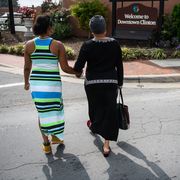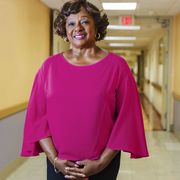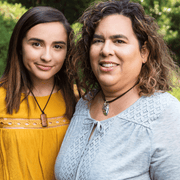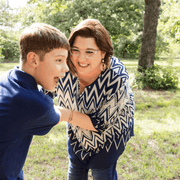I am my mom's primary caregiver, but I cannot be with her all the time, which adds a lot of responsibility and stress to my life. My mom has dementia. She lives in her own apartment in Hilton Head, SC, within a complex for seniors where aides come to check on her between 8 a.m. and 8 p.m. They make sure she is taking her medication, showering, and eating properly. I live with my husband in Massachusetts and my daughter and her family live near my mom. My daughter visits her often—sometimes to check on her but mostly to take her out to dinner or the park so her kids can spend quality time with their GiGi. Fully trusting and relying on someone else to take care of my mom, even someone in the family, is tough. Each month I make it a point to write or talk to the head nurse of the complex to set up my mom's doctors' appointments, review her grocery bills, and plan her weekly activities. But once I hang up, I have to trust that someone else is taking care of things and that my mom is safe because when I call and ask my mom if she ate lunch or went to the dentist when she was supposed to, her response is always "I don't know," or worse, "no."
About two years ago, I had to have a heartfelt conversation with my mom to tell her she couldn't go to her singing group anymore and needed an aide to help her on a daily basis. It was a challenging conversation to say the least. My mother loves to sing. For years, she sang with a choir in Hilton Head. But one day, she went to the wrong place for practice. Then I got a call from another singer in the group saying my mom's hygiene was bad, as if she hadn't showered in days. I was miles away at home, but I knew I needed to fly down to South Carolina and check on my mom. This is when I realized that she was beginning to struggle with signs of dementia. We sat in the car to have this conversation like I used to do with my daughter—they can't walk away, they have to listen. I put my hand on her shoulder and I didn't cry. I'm a crier but I was determined to have her understand why she needed the help a senior facility would provide. Since I was only visiting for a brief time during a break from my job as a junior high school teacher, I had to accomplish so much. My life as well as my mother's was becoming a little more complex.
We have journeyed through the adjustment period. Since then she's settled into her life in her new apartment with the help of her aides. We talk regularly, but the changes I notice in her tend to upset me. When I was a kid, my mom was president of the PTO and now it can be too difficult for her to go to activities in her senior complex—she wouldn't remember what time, where to go, or what to wear. It's hard to see her less vibrant than I'm used to. She spends a lot of time sitting alone in her apartment.
By going to caregiver meetings, talking with other caregivers, and reading articles, I learned how to have a relationship with my mom on a far different level than it had ever been. Before I call her, I write down a list of what we could talk about since she never has much to say. I also like to zone in on her lucid moments—if she tells me a story about her uncle or why she likes a certain tomato salad, I try to write it down. The good news is that I have the chance to build a new type of relationship with her, when so many of my friends don't have their mom around anymore. I feel happier and relieved since I altered the way I deal with my mom and think about the shift in our relationship.
Now that I'm 58 and retired, I bought a condo in Hilton Head and stay down there for longer periods of time, a month or more. That's part of the reason why I decided to retire. I can spend more than a few days in South Carolina and take my mom to appointments as well as spend some quality fun time with her. On my most recent visit, we went out to dinner twice, saw a show, and went to the movies. An aide curled my mom's hair, helped her pick out a skirt, and even put a spritz of perfume on. Being there makes it easier for us both. I can see that she has good days when she'll tell me about my grandson's visit and a concert she saw. And when I leave, I can't think about how she's possibly sitting in her apartment all alone, like I tend to imagine. I know she is safe and that I have to let go of my guilt for not being there and trust the people who care for her.
The most important thing I've learned is that my mom just wants to be treated with respect and dignity; just like she always did. Nothing had changed really, except how I act and react to her. I still need to be the strong-handed, in-charge person many times. I have also changed my tone of voice and the way I word what needs to be said when speaking important themes to her. In a few years, my husband and I hope to move down to South Carolina full time, which I'm sure will create new obstacles and teach me new lessons. My mom and I have both come to an understanding of what our roles are to be. I am the daughter but caregiver who makes decisions that keep her safe and presumably happy. When I am down there, she likes it because "I can do the thinking for her." She is the person who is trying to grasp this new way of having to think, act, and, react to her life.
I have learned to recognize when I need to step away, have some alone time, and especially reach out to others for support. I need to give myself permission to be me in order to be there for her.












